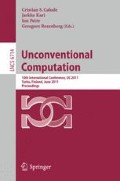Abstract
Due to imperfections in measurement and hardware, the flow of bits generated by a quantum random number generator (QRNG) contains bias and correlation, two symptoms of non-randomness. There is no algorithmic method to eliminate correlation as this amounts to guaranteeing incomputability. However, bias can be mitigated: QRNGs use normalisation techniques such as von Neumann’s method—the first and simplest technique for reducing bias—and other more efficient modifications.
In this paper we study von Neumann un-biasing normalisation for an ideal QRNG operating ‘to infinity’, i.e. producing an infinite bit-sequence. We show that, surprisingly, von Neumann un-biasing normalisation can both increase or decrease the (algorithmic) randomness of the generated sequences. The impact this has on the quality of incomputability of sequences of bits from QRNGs is discussed.
A successful application of von Neumann normalisation—in fact, any un-biasing transformation—does exactly what it promises, un-biasing, one (among infinitely many) symptoms of randomness; it will not produce ‘true’ randomness, a mathematically vacuous concept.
Access this chapter
Tax calculation will be finalised at checkout
Purchases are for personal use only
Preview
Unable to display preview. Download preview PDF.
References
Abbott, A.A., Calude, C.S.: Von Neumann normalisation of a quantum random number generator. Report CDMTCS-392, Centre for Discrete Mathematics and Theoretical Computer Science, University of Auckland, Auckland, New Zealand (2010)
Abbott, A.A., Calude, C.S., Svozil, K.: Unpublished work on the incomputability of quantum randomness (in preparation)
Abbott, A.A., Calude, C.S., Svozil, K.: A quantum random number generator certified by value indefiniteness. CDMTCS Research Report, 396 (2010)
Bell, J.S.: On the problem of hidden variables in quantum mechanics. Reviews of Modern Physics 38(3), 447–452 (1966)
Billingsley, P.: Probability and Measure. John Wiley & Sons, New York (1979)
Born, M.: Quantenmechanik der Stoßvorgänge. Zeitschrift für Physik 38, 803–837 (1926); English translation by Wheeler, J. A., Zurek, W.H.: Quantum Theory and Measurement, ch. I.2. Princeton University Press, Princeton (1983)
Calude, C.S.: Information and Randomness: An Algorithmic Perspective, 2nd edn. Springer, Berlin (2002)
Calude, C.S., Hertling, P., Jürgensen, H., Weihrauch, K.: Randomness on full shift spaces. Chaos, Solutions & Fractals 12(3), 491–503 (2001)
Calude, C.S., Svozil, K.: Quantum randomness and value indefiniteness. Advanced Science Letters 1, 165–168 (2008)
Downey, R., Hirschfeldt, D.: Algorithmic Randomness and Complexity. Theory and Applications of Computability. Springer, Heidelberg (2010)
Halmos, P.R.: Measure Theory. Springer, New York (1974)
Heywood, P., Redhead, M.L.G.: Nonlocality and the Kochen-Specker paradox. Foundations of Physics 13(5), 481–499 (1983)
id Quantique. Quantis—quantum random number generators (12/08/2009), http://idquantique.com/products/quantis.htm
Jauch, J.M.: Foundations of Quantum Mechanics. Addison-Wesley, Reading (1968)
Jennewein, T., Achleitner, U., Weihs, G., Weinfurter, H., Zeilinger, A.: A fast and compact quantum random number generator. Review of Scientific Instruments 71, 1675–1680 (2000)
Kac, M.: Statistical Independence in Probability, Analysis and Number Theory. The Carus Mathematical Monographs. The Mathematical Association of America (1959)
Kochen, S., Specker, E.: The problem of hidden variables in quantum mechanics. Journal of Mathematics and Mechanics 17, 59–87 (1967); Reprinted in Specker, E.: Selecta. Brikhäuser, Basel (1990)
Kuipers, L., Niederreiter, H.: Uniform Distribution of Sequences. John Wiley & Sons, New York (1974)
Kwon, O., Cho, Y., Kim, Y.: Quantum random number generator using photon-number path entanglement. Applied Optics 48(9), 1774–1778 (2009)
Ma, H., Wang, S., Zhang, D., Change, J., Ji, L., Hou, Y., Wu, L.: A random-number generator based on quantum entangled photon pairs. Chinese Physics Letters 21(19), 1961–1964 (2004)
Martin-Löf, P.: The definition of random sequences. Information and Control 9(6), 602–619 (1966)
Peres, Y.: Iterating von Neumann’s procedure for extracting random bits. The Annals of Statistics 20(1), 590–597 (1992)
Pironio, S., Acín, A., Massar, S., de la Giroday, A.B., Matsukevich, D.N., Maunz, P., Olmchenk, S., Hayes, D., Luo, L., Manning, T.A., Monroe, C.: Random numbers certified by Bell’s theorem. Nature 464(09008) (2010)
Schmidt, H.: Quantum-mechanical random-number generator. Journal of Applied Physics 41(2), 462–468 (1970)
Shen, Y., Tian, L., Zou, H.: Practical quantum random number generator based on measuring the shot noise of vacuum states. Physical Review A 81(063814) (2010)
Stefanov, A., Gisin, N., Guinnard, O., Guinnard, L., Zbinden, H.: Optical quantum random number generator. Journal of Modern Optics 47(4), 595–598 (2000)
Svozil, K.: The quantum coin toss – testing microphysical undecidability. Physics Letters A 143(9), 433–437 (1990)
Svozil, K.: Quantum information via state partitions and the context translation principle. Journal of Modern Optics 51, 811–819 (2004)
Svozil, K.: Three criteria for quantum random-number generators based on beam splitteres. Physical Review A 79(5), 054306 (2009)
Vadhan, S.: Pseudorandomness. Foundations and Trends in Theoretical Computer Science. Now publishers (to appear, 2011)
von Neumann, J.: Various techniques used in connection with random digits. National Bureau of Standards Applied Math Series 12, 36–38 (1951); In: Traub, A.H. (ed.) John von Neumann, Collected Works, pp. 768–770. MacMillan, New York (1963)
Author information
Authors and Affiliations
Editor information
Editors and Affiliations
Rights and permissions
Copyright information
© 2011 Springer-Verlag Berlin Heidelberg
About this paper
Cite this paper
Abbott, A.A., Calude, C.S. (2011). Von Neumann Normalisation and Symptoms of Randomness: An Application to Sequences of Quantum Random Bits. In: Calude, C.S., Kari, J., Petre, I., Rozenberg, G. (eds) Unconventional Computation. UC 2011. Lecture Notes in Computer Science, vol 6714. Springer, Berlin, Heidelberg. https://doi.org/10.1007/978-3-642-21341-0_10
Download citation
DOI: https://doi.org/10.1007/978-3-642-21341-0_10
Publisher Name: Springer, Berlin, Heidelberg
Print ISBN: 978-3-642-21340-3
Online ISBN: 978-3-642-21341-0
eBook Packages: Computer ScienceComputer Science (R0)

